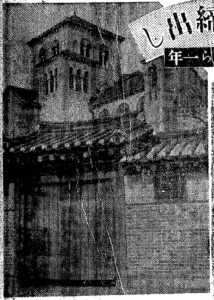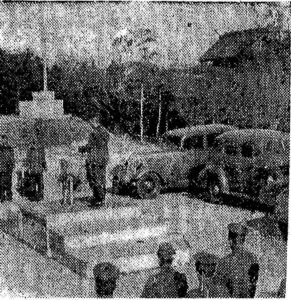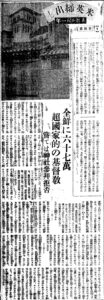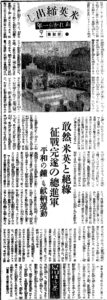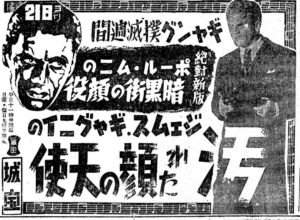The second story is about multiple British and American people who were caught by police committing the 'crime' of trying to buy 'Korea of the Japanese' by H. B. Drake at a bookstore in Jongno, Seoul.
I highly recommend reading 'Korea of the Japanese', which provides an interesting glimpse into 1930 Korea from the perspective of a British writer. Be warned, however, that the author comes across as a condescending, entitled English prick ("I became an ardent champion of imperialism, of strong and ruthless Government, of the white man's burden." - book p. 142, PDF p. 193). I struggled to understand why the colonial authorities hated this book, since the author makes many statements which are actually supportive of Imperial Japan's rule over Korea ("Left to themselves the Koreans would rot … No nation, however insignificant, however mean its contribution to mankind, can be allowed to fall into neglect and decay. And this is the essential justification of the Japanese rule in Korea." - book p. 148, PDF p. 199). I'm speculating that, perhaps, it's because the Japanese Emperor was not mentioned reverentially enough when describing the Emperor's portrait (book p. 25, PDF p. 52), perhaps because it has some mild criticisms of colonial Korea's educational system (book p. 136, PDF p. 187) or perhaps because it criticized Eastern thought as backward ("Principles which are commonplaces in the West, but not in the East ... that without order there can be no liberty; that liberty is not the birth of a moment, but of the labour of generations. Commonplaces, I repeat; yet to the Korean mind paradoxes and contradictions." - book p. 145, PDF p. 196).
(Translation)
Gyeongseong Ilbo (Keijo Nippo) December 4, 1942
They extended the evil clutches of their conspiracy until the day they left the Korean peninsula
Japanophobic books were found in the city
Shut out the United States and Britain!
One year since [the start of the Pacific War on December 8th]
Culture Edition
The entirety of the so-called culture that the American and British residents of the Korean peninsula were consciously inflicting on Korea was a conspiracy and a trick. Even the everyday language that they used contained a liquid juice that poisoned their victims, as if they were sprinkling a numbing magical fluid from a 35 millimeter film reel. Without American films, there would have been no film industry on the Korean peninsula. British-American culture is a monster of mental aggression, as demonstrated by the fact that those who failed to thoroughly read American and British writings were excluded from the ranks of the intellectuals. War was declared on December 8th when the U.S. and Britain were 'BANG!', hit on the head with a fiery iron hammer, and from that moment on, a truly heroic, constructive song began to be played on the Korean peninsula.
But speaking of an earlier time, on the day the Americans and the British made their departure, they were not leaving their hands idle. All the way up until the day they left, they did not forget to keep planting the roots of their conspiracy into the young Koreans who had soaked in their culture for decades until it had seeped into the marrow of their bones. Here is an example…
On the [redacted] day of the [redacted] month, Mr. Masaki, head teacher of the National School attached to Seoul First Normal School, found a dangerous, explosive book among the many books sold off by the deported Americans at a bookstore in Jongno. It was an English book on which the word "Banzai" was literally printed in Japanese, but its content was a series of provocatively written fanciful stories about a war between Japan and the United States. The author's name was written on the front cover as "Parabellum", and below it was an explanatory note: "This book was written mainly based on German publications from 1909," which was a little eyebrow-raising.
Immediately after the Russo-Japanese War, an American military journalist, frightened by the real strength of the emerging Japanese power and motivated to overthrow Japan as soon as possible, plotted to provoke a war between Japan and the U.S. and isolate Japan by telling the whole world, including all the Asian peoples excluding the Japanese, that "Japan must be feared", which was a Yellow Peril idea. This shows the traces of a conspiracy. It also contains a careful plot to separate Japan from Germany. The book was published by Stanley Paul & Co. of London, England in an attempt to undermine the Anglo-Japanese Alliance of the time. Furthermore, the preface of the book states, "This preface is not intended to provoke the peoples of the two countries. It is nothing more than a preparation for the hope of peace." But from the first page of the main text, the author refers to Japan as a "cursed yellow monkey," a vile insult that could not have been expressed by an Englishman of the time, so the author reveals himself to be an American.
It is an undeniable fact that the entire text of the book was written by an American who regarded Japan as a virtual enemy. It is also clear that the author's name, "Parabellum," is a pseudonym for "parable". Furthermore, what cannot be overlooked is the fact that the publisher of the book was Stanley Paul, a well-known publisher of Christian Bibles, and the book was probably distributed around the world by missionaries along with the Bible, which is a shocking fact. The book starts with the Japanese military occupation of the Philippines, then the Japanese people living in the U.S. all take up arms to start an uprising. The description of what happens until the invasion of the West Coast is written in all-out vulgar and abusive language against Japan. The shape of the font on the last line is changed to incite, "The yellow danger grows ever greater." Interestingly, the author also warns that "Japan will surely take us off guard by attacking us during the holidays," so what does the author think of our Navy's successful surprise attack on Pearl Harbor in the early stages of the Greater East Asia War?
But how many billions of people around the world have misjudged Japan as a result of this book? What will be the result of this terrible poisonous book sold by the American to the bookshop in Jongno as he was leaving the Korean peninsula? They did these things with this goal in mind from the very beginning. Fortunately, the book was purchased by Head Teacher Masaki and was kept deep inside his library since that day, which was a fortunate thing for the Korean peninsula.
This was not the only conspiracy plotted by the deported Americans and British. There is a second story relating to a detestable cultural conspiracy. On the [redacted] day of the [redacted] month, a few days before deportation, the enemy Americans and the British abused the free lifestyle that was allowed even for them by Japan's generous arrangement, and they almost purchased a certain book in Jongno. Their goal was not achieved due to the fact that the scene of the crime was discovered through an astute inspection by the police. That book that they wanted was the Chrysanthemum Edition of "Korea of the Japanese," a 225-page book published by William Clowes and Sons in London in 1930 and written by an Englishman named H. B. Drake. At the time, while the author was on his way to China and Manchuria for a tour, he visited his fellow countryman who lived in Korea. During his stay, he visited all of Korea, observing the situation in various parts of the country. It seems that he wrote the book immediately after he returned home, and he describes the footsteps of his meticulous research into modern Korean culture, customs, topography, mountains, humanity, geography, and so forth.
In addition, the 24 photographs, including the cover photograph, were painstakingly taken to provide evidence of the author's travels around the country, and the author's spying activities were clearly evident even in the clear explanations on the back of this published book.
We do not know when this book infiltrated Seoul, but we cannot help but be horrified by the past infatuation with the U.S. and Britain that was quite prevalent among the people living on the Korean peninsula, when we imagine what was going on inside the minds of some of our enemies who wanted to purchase this book. It was not long before the Americans and British, who had poisoned the Korean peninsula with their voiceless conspiracies, subsequently disappeared from this corner of East Asia, and Righteous Japan passed judgment on a culture that only those conspirators could feel proud of. [Photo: English-language books "Korea of the Japanese," which the enemy Americans and British people tried to carry away in a last ditch effort, and "Banzai," which they left behind to promote their "invincible" conspiracy.]
Source: https://www.archive.org/details/kjnp-1942-12-04
(Transcription)
京城日報 1942年12月4日
半島を去る日迄伸ばす謀略の魔手
街頭に”恐日病”の書籍
米英締め出し
あれから一年
文化篇
半島在住の米英人が、意識的に朝鮮になした彼等の文化と称するもの全部が陰謀であり、術策であった。用いる日常の言葉さえ相手を毒する液汁が含まれていたのだ。僅か三十五ミリの一齣から痺れるような魔液を振り注いで、アメリカ映画なくば半島の映画興行界は成り立たなかった。米英の著述を耽読せねばインテリの仲間外れになる、等々米英文化は精神侵略の魔手であったのだ。その米英の脳天に”ガンー”と鉄火の槌を喰わせたのが十二月八日の宣戦その一撃の瞬間から半島の天地に真に雄々しい建設譜が奏でられ出したのだ。
話は少し前にもどるが、『米英人去る』の日、彼等は手を束ねてはいなかった。自分達が幾十年、自分達の文化を骨の髄まで滲み通らせて来た半島青年に、去るが去る日まで謀略の根を植えて行くことを忘れなかった。その事例の一つ...
〇月〇日、京城師範学校第一附属国民学校正木教頭が鐘路街の一書房で退去米人が売り払って行った多くの書籍の中から危険な爆弾書を発見した。それは『バンザイ』と日本語をそのまま用いた英書であったが、内容は空想による日米戦記が刺戟を含んで書き連ねてあった。この著述者はただ表紙にパラベリュームと筆名を載せ、その下には『一九〇九年ドイツの公表によるものを中心として著述した』と断り書まで添えてあるが、これがちょっと眉つば物。
日露戦争の直後、米人軍事記者あたりが、新興日本の実力に怯えて早くも日本打倒の底意をまずこの日米戦線で刺戟、併せて『日本恐るべし』と黄色人種の禍を説いて世界殊に日本を除く全アジア民族に誣いて日本を孤立させようと企んだ。謀略の跡を示している。そこにはまた日独離間の周到な企図、また発行所を英国ロンドンのスタンレイ・パウロ商会とし、当時の日英同盟に水を注ごうとした魂胆。しかも序文には『この叙述は両国民を刺戟する意図をもってしたものではない。ただ平和を希うための準備にほかならない』と断りながら本文の第一頁から日本を指して『呪うべき黄色い猿め』と当時の英国人型では表現し得なかった下劣な侮言を用い、自ら筆者が米人であることを暴露している。
全文全く日本を仮想敵国とした米人の著書であることは紛れもない事実だ。また著者名のパラベリュームがパラブル(比喩)を訛った仮の筆名であることも判然としている。さらに見逃せないことは、その発行者がキリスト聖書発行所として著名なパウロ商会で、聖書と共に宣教師らの手で世界に頒布されたであろうことを思い、慄然たるを得ない。かくてこの内容は日本軍の比島占領から始まって米国内居住の日本人が一斉に武器を得て蜂起し、西海岸を冒すまでの経過を徹頭徹尾日本への俗悪罵言をもって書かれ、最後の一行には特に活字の形を変えて『黄色い危険が益々大きくなって行く』と煽動している。また興味あることには『日本は必ず休日に油断を突いてやってくる』と警告してあるが、大東亜戦の緒戦にわが海軍の真珠湾大奇襲の成功を筆者はどうみているであろうか。
だがこの書によって今日まで世界の幾十億が日本を誤って見たことか。半島を退去するに及んで一米人が鐘路の書房に売り払った恐るべき毒書の結果がどうなるか。彼らは最初から意識してなされたものである。幸い正木教頭の手によって買い上げられ、その日から氏の書庫深くに蔵されたことは半島のために欣ばしい。
さらに退去米英人の謀略はこれだけではなかった。憎むべき文化謀略はさらに第二話を生んだ。〇〇月〇日、これも退去の数日前、敵米英人とはいえ日本の寛大な取計いによる生活上の自由を濫用して彼らは鐘路街で一冊の書籍を購入しかかった。それが鋭敏な査察による官憲の現場発見によってあえなく目的は達せられなかったが、彼らの望んだ書物とは一九三〇年ロンドンにおけるウィリアム・クロー・エンド・ソン書房発行になる『日本の朝鮮』二百二十五頁物の菊版で著者はエチ・ビー・ドレークという英人。当時満支を視察の途次朝鮮に住む同国人を尋ねて滞在中、全鮮をめぐって各地の事情を視聴。帰国後直ちに筆を執ったものらしく、かなり近代朝鮮の文化、風俗、地形、山岳、人情、地理などを克明に調査した足跡を記述の中に語っていた。
さらに口絵その他二十四枚の写真は実に丹念に著者が鮮内を行脚した証拠を止め、明かにスパイ的行動に出たことは、この発行された書籍の裏に秘された明確な綴りの一つ一つにも窺われていた。
この書がいつから京城に潜入したかは判然とせぬが、とまれこの書を買い上げようとした一敵性人の考えが奈辺にあったかを想像するとき、半島に住む者の間に相当混混していた過去の米英心酔に対し慄然たるを得ないのである。声なき謀略に半島を毒した彼等米英人が今こそ東洋の一角から姿を潜め、その用いた彼等のみの誇る文化に道義日本の審判が下されたのはそれより間もなくであった。【写真=敵米英人が最後の足掻きを見せて持ち去ろうとした『日本の朝鮮』および”不敵”謀略宣伝のため置き去らんとした『バンザイ』の両英文著書】


